Theater
Director Alan Paul enjoying frothy romp ‘The Comedy of Errors’
Theater bug bit Michael Kahn protege at young age
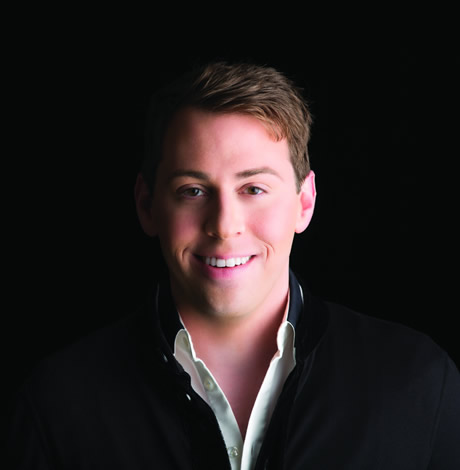
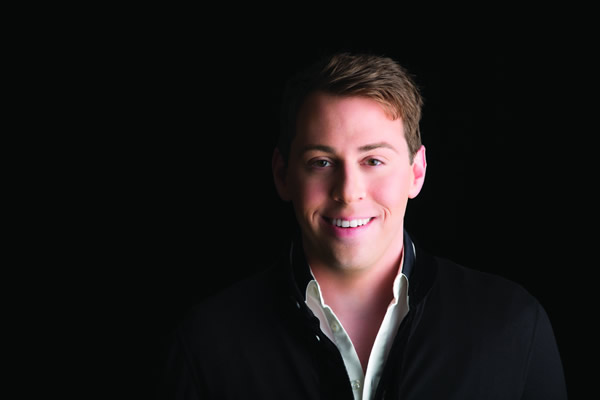
Alan Paul says a ‘60s Greek aesthetic has informed much of his work. (Photo courtesy STC)
‘The Comedy of Errors’
Through Oct. 28
Shakespeare Theatre Company
at Lansburgh Theatre
450 7th St., N.W.
$44-118
Director Alan Paul came out at just 15. He was the last of his group at performing arts camp to come clean on his sexuality. The rest had all come out at about 12, he says. Paul felt quite left behind. Certainly he’s never been behind professionally.
At 25, Paul was named Shakespeare Theatre Company associate artistic director under the auspices of legendary STC Artistic Director Michael Kahn. Now 34, Paul boasts an impressive CV crammed with work on classics, opera and musicals. He’s been nominated for several Helen Hayes Awards for directing and won for STC’s “A Funny Thing Happened on the Way to the Forum.” His more recent production of “Camelot” has broken STC box office records.
Growing up in nearby Potomac, Md., Paul made frequent trips to New York to see Broadway musicals. He loved “Sunset Boulevard” with Glenn Close as Norma Desmond but was verily obsessed with the London cast recording featuring Patti LuPone as the reclusive silent film star. From an early age, Paul longed to be a part of the theater world and struck up correspondences with many Broadway professionals. After graduating from Northwestern University where he was in the musical theater program, Paul returned to his hometown to pursue a career in earnest. He splits his time between Washington and New York where he’s often called to meet with designers and audition actors.
Currently, Paul is staging STC’s production of Shakespeare’s early work “The Comedy of Errors,” a farce jam-packed with slapstick and mistaken identity revolving around two sets of identical twins. A twin himself, Paul felt instantly at home with the work’s situations and possibilities.
Recently he took a break from tech week to talk about his latest directorial effort and other things.
WASHINGTON BLADE: I read that you wanted to plumb the work for its romantic and elegant elements. True?
ALAN PAUL: Those were early words. When you see the fart jokes you won’t think elegance. It’s a difficult play because it has to be funny but it also has to be about real people. The characters are searching for lost loved ones. The premise is deep. The comedy of it is what happens in the course of this crazy 24 hours. But there is elegance in the physical production. I wanted a mostly black-and-white set and costumes. I’m inspired by films from the early ‘60s like the Greek romantic comedy “Never on a Sunday” starring Melina Mercouri.
BLADE: Is it wrong to associate you primarily with musicals?
PAUL: I’ve directed many plays but musicals have been the most visible thing I’ve done. I love both. It’s fun to jump back and forth. In addition to Michael (Kahn), my heroes include Jack O’Brien. He directed “Hairspray” and “Henry IV” on Broadway in the same year. And Michael Blakemore who on the same night won Tony Awards for directing a play and a musical, “Copenhagen” and a revival of “Kiss Me, Kate,” respectively. People mistakenly think a director of musicals can’t be serious or real. Or a play director can’t be fun. I try really hard to play both sides of that. For “The Comedy of Errors,” we’re including some original music. It’s about creating that ‘60s Greek feeling. Also, the cast includes Eleasha Gamble who plays the courtesan and owner of the Porcupine Club. How could I not give her a song?
BLADE: You’re a twin. Has that been your way into “The Comedy of Errors”?
PAUL: Yes, I have a twin sister. For me, I understand the bond with my sister. The bond is different from what I have with anyone else. We share a sense of humor. If you looked at our text messages you’d have no idea what it means but we think it’s hilarious. Twins figure into so many of Shakespeare’s plays. I think Shakespeare had twins and one of them died. This play, and “Twelfth Night” especially, is about needing to find your other half. Shakespeare had a fantasy of family coming back together that never happened. I believe it comes from an extraordinary sense of loss.
BLADE: How did you go about casting twins?
PAUL: I’ve cast two sets of twins who look nothing alike. Put the same hat on them and who cares? We get it.
BLADE: Tell me about how Michael Kahn hired you.
PAUL: It was over drinks at Playbill Café. I miss that place so much. Not a big deal for him, but life changing for me.
BLADE: This is Michael Kahn’s last season at STC. What has he taught you?
PAUL: He pushed me very hard when I was very young to run the department. He gave me a lot of responsibility and expected me to know what I was doing. I figured out how to do it and I think that he gave me a lot of confidence early on. Also, I will take away his incredibly high standards. He won’t let anything go that does meet a certain standard. And I have that myself. An internal GPS that says “not good enough.”
BLADE: Will you work under Kahn’s appointed successor, Simon Godwin?
PAUL: That’s an ongoing conversation. I like him and am excited to see what he’ll do.
BLADE: Was directing The Comedy of Errors your choice?
PAUL: STC wasn’t doing a musical this season so I knew I’d do a play. I really wanted to do Shakespeare so Michael and I talked about a lot of different titles. Comedies to dramas. We hadn’t done this one in a long time. I thought it was a great way to open the season and I wanted to assemble a group of funny people that the audience would know. It’s always fun to have artists on stage together who have contributed to the success of STC. People like Tom Story, Nancy Robinette, Ted van Griethuysen, Sarah Marshall.
BLADE: And don’t forget Veanne Cox as Adriana.
PAUL: Yes, wait until you see her arguing with a parrot. She has a pet bird that talks to her.
BLADE: Last season you broke Shakespeare Theatre Company sales record with your production of “Camelot.” How do you explain that?
PAUL: The election. I’d been uncertain about doing “Camelot.” People love the music but not so much the book. But when Hillary Clinton lost the election, I couldn’t help but wonder what Obama was thinking about his legacy. That’s what King Arthur goes through at the end of the play. When the Round table is cracked he says that barbarism is the natural state of man. Then at the end of the scene he meets the kid and his spirit is revived. I thought that’s the story Washington needed to hear. And I was right.
BLADE: There are so many shows opening right about now. Why see “The Comedy of Errors”?
PAUL: Well, it’s short — 95 action-packed minutes. Nobody wants to see a really long play. With this production, you’re out in time to get drinks or supper. Also, it’s funny. In these times of the stressful news cycle, I want to give people some entertainment and joy.
BLADE: Tell me about your childhood letter writing.
PAUL: Yes, I have a whole book of correspondence, about one hundred letters. I started writing letter c/o the stage door when I was a kid. I wrote stage managers, a dance captain and actors like George Hearn. I have letters from Audra McDonald before she was famous. Bob Mackie wrote me. I wanted to know how things worked.
BLADE: How does being gay figure into your work?
PAUL: Freedom to have fun with sexuality. Someone in the show accused me of trying to make this into a John Waters’ movie. I said that’s a good thing. There’s lots of drag. Sarah Marshall plays a man, Dr. Pinch. Three men double as female characters.
BLADE Any directorial projects you’re itching to tackle?
PAUL Yes, two musical and a play. In keeping with my Greek ‘60s film thing, I’d like to do the musical “Zorba.” And another is “Golden Boy,” the musical based the Clifford Odets play about a young man from Harlem who pursues prizefighting despite his family’s objections. It needs a little doctoring, but I think that would make a wonderful Broadway revival. And the play is “Teenage Dick.” It’s got a provocative title but it’s actually a version of Shakespeare’s “Richard III” set in an American high school. It played at the Public Theater in New York this summer. Please someone in Washington let me do this. It will be a huge hit in this town, I’m certain.
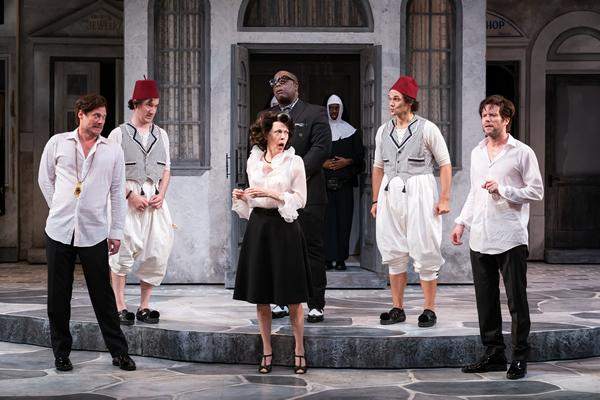
The cast of ‘The Comedy of Errors,’ a brisk farce now on the boards at Shakespeare Theatre Co. (Photo by Scott Suchman; courtesy STC)
Theater
Studio’s ‘Mother Play’ draws from lesbian playwright’s past
A poignant memory piece laced with sadness and wry laughs
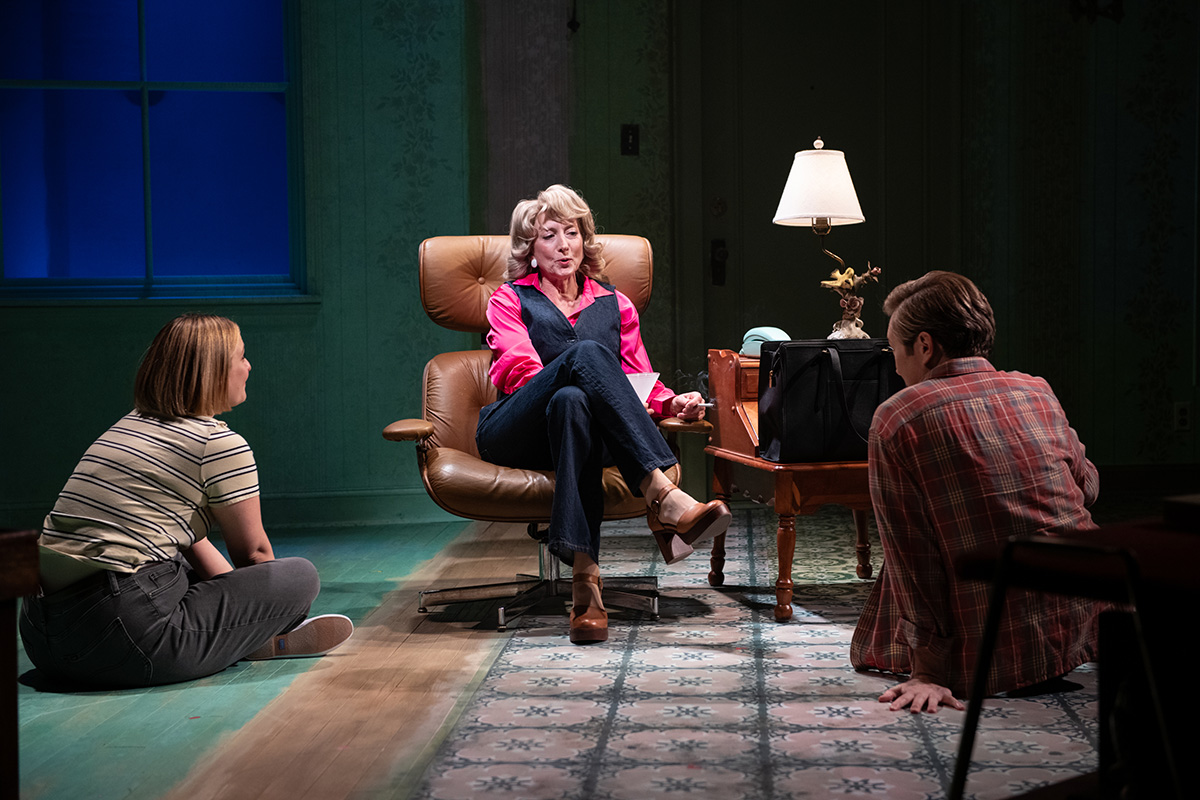
‘The Mother Play’
Through Jan. 4
Studio Theatre
1501 14th St., N.W.
$42 – $112
Studiotheatre.org
“The Mother Play” isn’t the first work by Pulitzer Prize-winning lesbian playwright Paula Vogel that draws from her past. It’s just the most recent.
Currently enjoying an extended run at Studio Theatre, “The Mother Play,” (also known as “The Mother Play: A Play in Five Evictions,” or more simply, “Mother Play”) is a 90-minute powerful and poignant memory piece laced with sadness and wry laughs.
The mother in question is Phyllis Herman (played exquisitely by Kate Eastwood Norris), a divorced government secretary bringing up two children under difficult circumstances. When we meet them it’s 1964 and the family is living in a depressing subterranean apartment adjacent to the building’s trash room.
Phyllis isn’t exactly cut out for single motherhood; an alcoholic chain-smoker with two gay offspring, Carl and Martha, both in their early teens, she seems beyond her depth.
In spite (or because of) the challenges, things are never dull in the Herman home. Phyllis is warring with landlords, drinking, or involved in some other domestic intrigue. At the same time, Carl is glued to books by authors like Jane Austen, and queer novelist Lytton Strachey, while Martha is charged with topping off mother’s drinks, not a mean feat.
Despite having an emotionally and physically withholding parent, adolescent Martha is finding her way. Fortunately, she has nurturing older brother Carl (the excellent Stanley Bahorek) who introduces her to queer classics like “The Well of Loneliness” by Radclyffe Hall, and encourages Martha to pursue lofty learning goals.
Zoe Mann’s Martha is just how you might imagine the young Vogel – bright, searching, and a tad awkward.
As the play moves through the decades, Martha becomes an increasingly confident young lesbian before sliding comfortably into early middle age. Over time, her attitude toward her mother becomes more sympathetic. It’s a convincing and pleasing performance.
Phyllis is big on appearances, mainly her own. She has good taste and a sharp eye for thrift store and Goodwill finds including Chanel or a Von Furstenberg wrap dress (which looks smashing on Eastwood Norris, by the way), crowned with the blonde wig of the moment.
Time and place figure heavily into Vogel’s play. The setting is specific: “A series of apartments in Prince George’s and Montgomery County from 1964 to the 21st century, from subbasement custodial units that would now be Section 8 housing to 3-bedroom units.”
Krit Robinson’s cunning set allows for quick costume and prop changes as decades seamlessly move from one to the next. And if by magic, projection designer Shawn Boyle periodically covers the walls with scurrying roaches, a persistent problem for these renters.
Margot Bordelon directs with sensitivity and nuance. Her take on Vogel’s tragicomedy hits all the marks.
Near the play’s end, there’s a scene sometimes referred to as “The Phyllis Ballet.” Here, mother sits onstage silently in front of her dressing table mirror. She is removed of artifice and oozes a mixture of vulnerability but not without some strength. It’s longish for a wordless scene, but Bordelon has paced it perfectly.
When Martha arranges a night of family fun with mom and now out and proud brother at Lost and Found (the legendary D.C. gay disco), the plan backfires spectacularly. Not long after, Phyllis’ desire for outside approval resurfaces tenfold, evidenced by extreme discomfort when Carl, her favorite child, becomes visibly ill with HIV/AIDS symptoms.
Other semi-autobiographical plays from the DMV native’s oeuvre include “The Baltimore Waltz,” a darkly funny, yet moving piece written in memory of her brother (Carl Vogel), who died of AIDS in 1988. The playwright additionally wrote “How I Learned to Drive,” an acclaimed play heavily inspired by her own experiences with sexual abuse as a teenager.
“The Mother Play” made its debut on Broadway in 2024, featuring Jessica Lange in the eponymous role, earning her a Tony Award nomination.
Like other real-life matriarch inspired characters (Mary Tyrone, Amanda Wingfield, Violet Weston to name a few) Phyllis Herman seems poised to join that pantheon of complicated, women.
Theater
D.C. theater scene has something for everyone this holiday season
‘Nutcracker,’ ‘A Christmas Carol,’ and much more
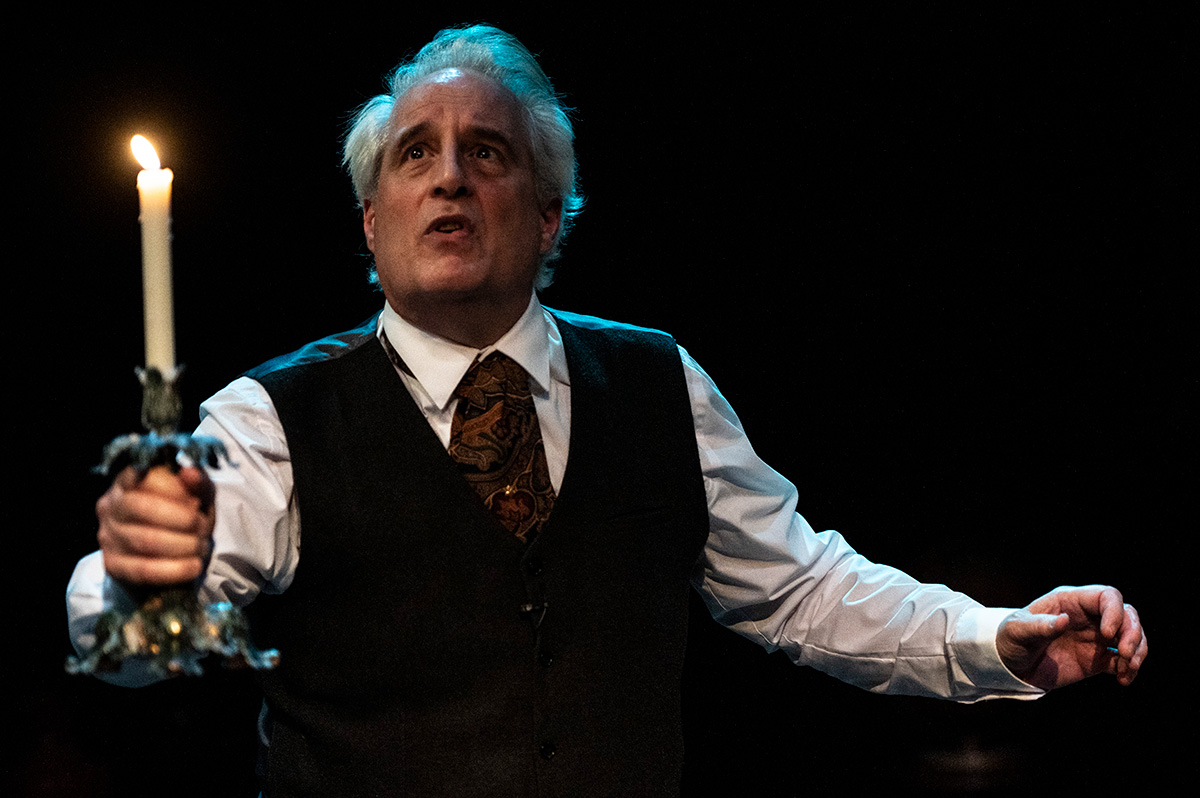
With its familiar music, yuletide imagery, and storytelling, theater can be a big part of the holidays. Add to that making memories and theater tickets wrapped as presents under the tree, and it’s a seasonal no brainer.
Folger Theatre presents “Resplendent Joy: Christmas Traditions from Spain and Portugal” (Dec. 5-14); the marvelous Folger Consort will perform early Spanish Christmas carols and traditional holiday music from early modern Spain and Portugal: folger.edu/resplendent
At Round House Theatre, playwright Sam Holcroft’s “Rules for Living” (Dec. 3-Jan. 4) makes its U.S. premiere. The darkly funny holiday comedy was a hit in London and is now hoping to repeat that success with a version tailored for the states. The seven-person cast includes versatile actors Naomi Jacobson and real-life spouse John Lescault. Ryan Rillette directs. roundhousetheatre.org
Theatre J presents “Chanukah in the Dark” (Dec. 6-21), an hour-long play ideal for ages five and up. “When the lights go out during Chanukah, Max and family begin sharing songs, stories, and traditions — only to discover the lights they needed and the miracles they searched for were in their midst all along.” edcjcc.org
The Cathedral Choral Society’s “Joy of Christmas” (Dec. 13-14) presents a wonderful program of carols and beloved holiday favorites at the festively decorated National Cathedral. The program features Seraph Brass, organist Edward Hewes, Carillonneur Edward M. Nassor, percussionist Mary La Blanc of “The President’s Own” U.S. Marine Band, and the Eastern Concert Choir from Eastern Senior High School. Cathedralchoralsociety.org
With “The Holiday Show,” (Dec. 13, 14, and 20), the Gay Men’s Chorus returns to entertain audiences with its annual and most popular show.
This year the holiday extravaganza is bigger than ever at historic Lincoln Theatre with new, soulful arrangements of favorite holiday carols: “The reindeer will be high-kicking and the snowflakes will sparkle. Songs include “O Holy Night,” “Rudolph the Red Nosed Reindeer,” “Let It Snow,” “We Wish You the Merriest,” and “Go Tell It on the Mountain.’” gmcw.org
At Olney’s intimate Mulitz-Gudelsky Theatre Lab, out actor Michael Russotto is back for the holiday season in his solo show “Christmas Carol: A Ghost Story of Christmas” (through Dec. 28). The talented Russotto portrays nearly 50 different characters from the Charles Dickens classic, that proves “funnier and far more relevant than you might imagine.” Olneytheatre.org
Also on holiday offer in the DMV are a jolly bunch of musical chestnuts as well as reliable Christmas crowd-pleasers.
Included on the roster is Olney Theatre’s production of Jerry Herman’s “Hello, Dolly!” (through Jan. 4) starring the mega-talented Nova Y. Payton. Based on the play “The Matchmaker” by famed gay playwright Thornton Wilder, the musical has proved a vehicle for many a diva including Carol Channing, Pearl Bailey, Bette Midler, and Barbra Streisand. Now Payton dons the mantle and the buzz is good.
Another beloved musical is “Fiddler on the Roof” (through Jan. 25), the story of Tevye, a poor Jewish milkman, his family and their tight-knit community who honor tradition while contending with pogroms in Czarist Russia. Currently being performed intimately in the round at Signature Theatre in Arlington and directed by Joe Calarco, the large cast features actors Douglas Sills, Chrisopher Bloch, and terrific out actor Jake Loewenthal as the poor tailor Motel Kamzoil, all singing Broadway favorites like “Sunrise, Sunset” “If I Were a Rich Man” and “Matchmaker.” sigtheatre.org
At Shakespeare Theatre Company’s Harman Hall is Frank Loesser’s “Guys and Dolls” (through Jan. 4). Based on tales from famed American journalist Damon Runyon, the show focuses on two overlapping love stories set in Depression-era Times Square. The terrific score includes songs like “Luck Be a Lady,” “Sit Down, You’re Rockin’ the Boat,” “A Bushel and a Peck,” and more songs you’ll know. Directed by Francesca Zambello and choreographed by Joshua Bergasse.
The cast includes Julie Benko, Lamont Brown, and Holly Twyford as General Matilda B. Cartwright, which is reason enough to buy a ticket. shakespearetheatre.org
And for hardcore traditionalists there’s the Washington Ballet’s “The Nutcracker” (through Dec. 29) with its balletic magic at the charming gilded Warner Theatre. The beloved production of Tchaikovsky’s ballet, here set in 1882 Georgetown, features a retinue of agile partiers, children, soldiers, rats, and notable figures from American history. washingtonballet.org
And last but hardly least, historic Ford’s Theatre presents “A Christmas Carol” (through Dec. 31), an enduring Washington tradition since I was youngish. Conceived by Michael Baron, this charming Dickens’ moneymaker again spotlights Craig Wallace as miserly Ebenezer Scrooge who after a night of ghostly visits, rediscovers Christmas joy. Fords.org
Theater
New take on ‘Some Like It Hot’ offers diverse casting
National Theatre production includes non-binary character
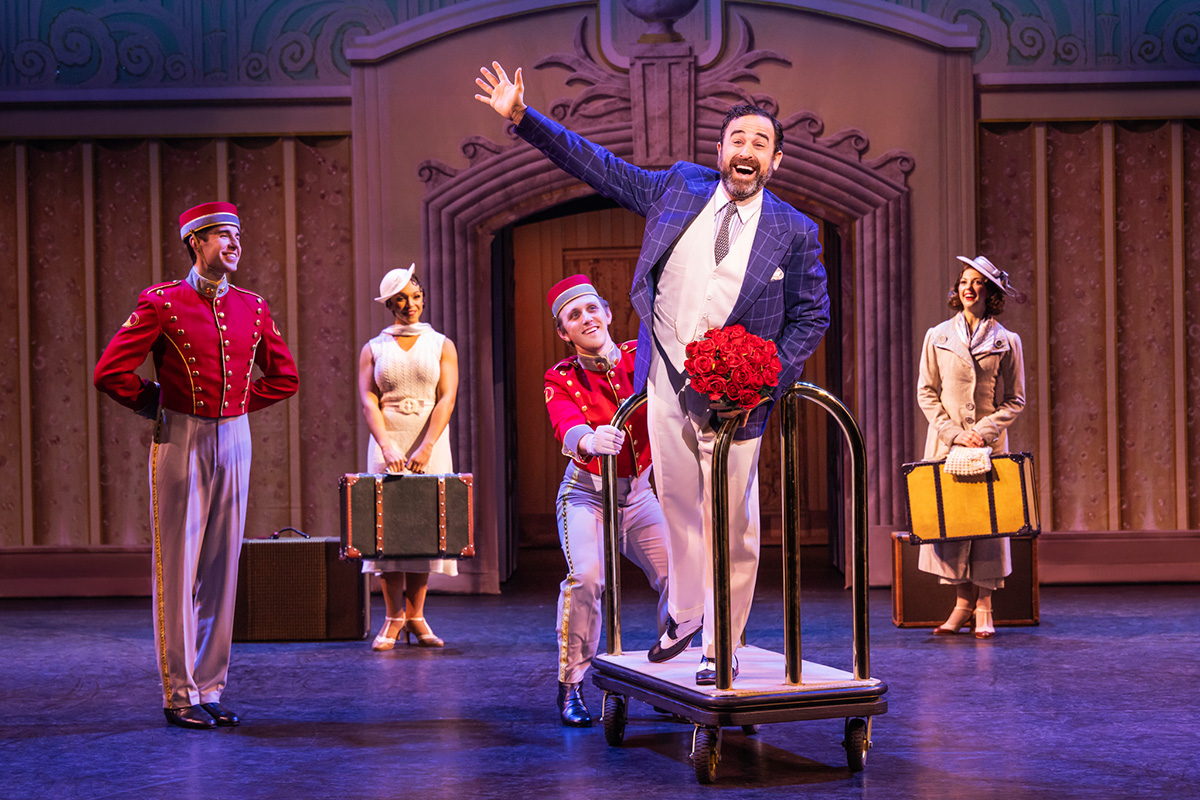
‘Some Like It Hot’
Nov. 25 – Dec. 7
The National Theatre
1321 Pennsylvania Ave., N.W.
Tickets starting at $67
Broadwayatthenational.com
For more than a year, out actor Edward Juvier has been part of the national tour of “Some Like It Hot,” the musical adaption of the 1959 classic comedy starring Marilyn Monroe and written and directed by Billy Wilder.
Juvier, 49, plays Osgood Fielding III, a cheery millionaire in Depression-era America.
With music by Marc Shaiman, lyrics by Scott Wittman and Shaiman, and a book by Matthew López and Amber Ruffin, the 2022 musical is quite different as well with diverse casting, increasingly complicated backstories, and a non-binary character (Daphne).
A talented tenor and Houston native, Juvier is a Cuban American who’s been working in musical theater since graduating from the Boston Conservatory in 2000.
“I personally love touring,” says Juvier. “I like the life on the road and visiting these old theater houses across the country. Seeing the locals that I remember and my friends and family that live all over. For me, a transient life is great. Maybe not so great for others.”
Early in his career, he toured with “Phantom of the Opera” for six years. He began in the ensemble and covered two principal roles, and moved to swing which gave him the longevity covering 11 different roles in that show, a life-changing gig that he remembers fondly.
WASHINGTON BLADE: As a gay actor touring in a hot musical with some queer themes do you feel that you make an impact?
EDWARD JUVIER: Oh yeah, it’s important for queer people to see representation on stage. Our version of the show is a sneak attack; it doesn’t hit you over the head with themes. Seeing an old story that takes a turn where you’re left to accept what’s happening onstage and by that time, you’re in love and rooting with the characters. You feel it from the audiences and we play some of the reddest of states.
Queer, trans, nonbinary people meet us at the stage door in tears thanking us for the representation. They didn’t even know when they came to the show that they’re going to see something with such an affirming message to their lives, and they’re thrilled when they find that out.
BLADE: How were you drawn into musical theater?
JUVIER: I was lucky that my Texas high school made annual trips to New York to see Broadway shows. On one trip, I remember seeing “Will Rogers Follies,” I felt like Keith Carradine was looking and talking right to me.
And the next day, we saw “Falsettos,” the original production. After seeing those two very different shows it was as if I blasted off into the Broadway world.
BLADE: Did “Falsettos,” a musical about AIDS, resonate with you as young gay student?
JUVIER: Absolutely. It shook me to the core.
BLADE: Has being gay made you a better actor?
JUVIER: I think what makes a great actor is somebody who has enormous empathy, able to put themselves in someone else’s shoes, and what better than a queer artist to be able to empathize.
I came out pre- “Will and Grace.” A different time to be coming out than it is now, which shows immense progress but also put us through challenges. It’s been a part of my journey.
I’m lucky to have the best, most supportive family. No Trumpers to deal with when I go home for the holidays. So, I’m grateful for that especially at this time of year.
BLADE: How do you approach a comic character like Osgood.
JUVIER: I approach him with honesty and simplicity and try to get out of the way of cheap jokes.
When I’m feeling that I’m pushing myself I remind myself to just say the words. I think the musical is so beautifully crafted in a way to brings the show to a new audience. Changes aren’t a diss on the original but the world has changed.
BLADE: Are you a big fan of the original?
JUIVIER: I respect the original. It’s been with me all my life especially being a queer artist. We grew up watching “Some Like It Hot.” This takes old themes and jokes that don’t land so well and brings it to a new audience.
Particularly with my role played originally and so brilliantly by famed comedian Joe E. Brown. In the movie he’s not a multi-dimensional character. He’s more of an old, rich pervy guy. That’s just how it was back then. And I’ve had the great privilege to play him differently.
-

 Congress5 days ago
Congress5 days agoEXCLUSIVE: George Santos speaks out on prison, Trump pardon, and more
-

 The White House5 days ago
The White House5 days agoWhite House deadnames highest-ranking transgender official
-

 The White House5 days ago
The White House5 days agoAs house Democrats release Epstein photos, Garcia continues to demand DOJ transparency
-

 District of Columbia5 days ago
District of Columbia5 days agoCapital Pride announces change in date for 2026 D.C. Pride parade and festival















